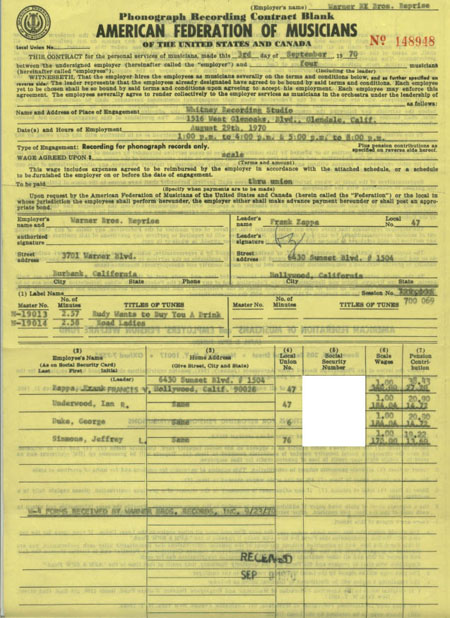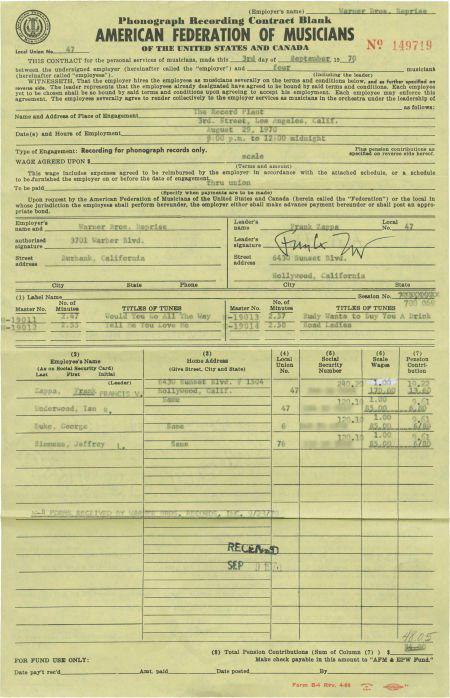The Recording Sessions
Liner notes, 1970
Recorded at: THE RECORD PLANT (Hollywood), TRIDENT STUDIOS (London), T.T.G. Inc. (Hollywood), WHITNEY STUDIOS (Glendale) [...]
The Record Plant
Rip Rense, liner notes for "Sharleena," The Lost Episodes (1996)
Date: 1970
Location: Record Plant Studios, Hollywood, Calif.
Original recording medium: 16-track analog
Recording engineer: Gary Kellgren
Remix engineer: Gary Kellgren
Remix facility: Record Plant Studios, Hollywood, Calif.
[...] Musicians: DON "SUGAR CANE" HARRIS (vocal and electric violin);
FZ (guitar and background vocals); IAN UNDERWOOD (keyboard and saxes);
MAX BENNETT (bass); AYNSLEY DUNBAR (drums)
March 4-11, 1970—The Record Plant, Hollywood, CA
Greg Russo, Cosmik Debris: The Collected History And Improvisations Of Frank Zappa (The Son Of Revised), 2003, p. 282
03/04/70 (7-10PM, 10PM-1AM & 1:30-4:30AM) The Record Plant, Hollywood, CA—Sharleena; Love Will Make You Lose Your Mind; The Clap [Chunga's Revenge]; I'm A Rolling Stone
MUSICIANS: FZ, Ian R. Underwood, Donald F. Harris, Max R. Bennett03/09/70 (12-3PM & 3:30-6:30PM) The Record Plant, Hollywood, CA—Twinkle Tits; Chunga's Revenge [Transylvania Boogie]
MUSICIANS: FZ, Ian R. Underwood, Donald F. Harris, Max R. Bennett03/10/70 (12-3PM & 3:30-6:30PM) The Record Plant, Hollywood, CA—Khaki Sack; Bass And Drum Song [Tommy/Vincent Duo]
MUSICIANS: FZ, Ian R. Underwood, Max R. Bennett03/11/70 (3-6PM, 7-10PM & 10PM-1AM) The Record Plant, Hollywood, CA—Sharleena; The Clap [Chunga's Revenge]; Twinkle Tits; I'm A Rolling Stone
MUSICIANS: FZ, Ian R. Underwood, Donald F. Harris
Paul Verna, "From Auto Sound to Infrasound, Hidley's Career Has Been Built On Breakthroughs," Billboard, July 1, 1995
[Tom] Hidley's ingenuity must have struck a chord with Hendrix, because the next time the artist stopped at the Record Plant in New York, he raved to that studio's owners, Gary Kellgren and Chris Stone, about TTG.
Stone says, "Hendrix came in to the Record Plant just jumping up and down because he'd been to L.A. doing concerts and was taken by Eric Burdon to this studio in L.A. He had no idea where it was, but he said they had something that made his guitar sound good. So he said to Kellgren, 'You gotta hear it.' So Kellgren said to me, 'Stone, we gotta go to L.A.'"
When Stone and Kellgren went to TTG to hear what Hendrix had raved about, they were so impressed by Hidley's design breakthroughs that they said, "We've gotta have this guy," according to Stone. But rather than ask Hidley to make yet another cross-country trek in his Lincoln, Stone and Kellgren decided to open a Los Angeles branch of the Record Plant. They hired Hidley as director of technical operations for all of the Record Plant's studios—the flagship in New York, the new facility in L.A., and a third room in Sausalito, Calif.
[...] [Hidley's] final contribution to the Record Plant before leaving in 1971 to form his own firm was the 24-track machine, built in collaboration with Jeep Harned at MCI.
June 1970—Trident Studios, London, UK
Mark Volman, interviewed by Richard Williams and Michael Watts, Melody Maker, December 5, 1970
Where was it done? Practically all of it in the States there was only one track done at Trident, here in London.
FZ, interviewed by International Times, March 1977
I recorded at Trident once and didn't care for it much.
- See notes for "Envelopes" on London Symphony Orchestra Vols. I & II (1983/1987).
- See The Mothers 1970 (2020).
August 28-29, 1970—Whitney Recording Studios, Glendale, CA
Greg Russo, Cosmik Debris: The Collected History And Improvisations Of Frank Zappa (The Son Of Revised), 2003, p. 283
08/28/70 (2-5PM & 7-10PM) Whitney Recording Studios, Glendale, CA—Would You Go All The Way; Tell Me You Love Me
MUSICIANS: FZ, Ian R. Underwood, George Duke, Jeffrey L. Simmons08/29/70 (1-4PM & 5-8PM) Whitney Recording Studios, Glendale, CA—Rudy Wants To Buy Yez A Drink; Road Ladies
MUSICIANS: FZ, Ian R. Underwood, George Duke, Jeffrey L. Simmons
Recording Contract
August 29, 1970—The Record Plant, LA
Greg Russo, Cosmik Debris: The Collected History And Improvisations Of Frank Zappa (The Son Of Revised), 2003, p. 283
08/29/70 (9PM-12midnight) The Record Plant, Hollywood, CA—Would You Go All The Way; Tell Me You Love Me; Rudy Wants To Buy Yez A Drink; Road Ladies
MUSICIANS: FZ, Ian R. Underwood, George Duke, Jeffrey L. Simmons
Recording Contract
Howard Kaylan with Jeff Tamarkin, Shell Shocked, 2013, p. 122
Into the studio when we weren't rehearsing. This would be Chunga's Revenge. The tracks were cut at Whitney Studios in Glendale during the day and the vocals were done by night at the Record Plant.
Session Sheets vs Album Credits
| Session Sheets | Songs | Album Credits |
|---|---|---|
|
03/04/70 The Record Plant—FZ, Ian R. Underwood, Donald F. Harris, Max R. Bennett 03/11/70 The Record Plant—FZ, Ian R. Underwood, Donald F. Harris |
Sharleena |
TLE (1996) DON "SUGAR CANE" HARRIS (vocal and electric violin); FZ (guitar and background vocals); IAN UNDERWOOD (keyboard and saxes); MAX BENNETT (bass); AYNSLEY DUNBAR (drums) |
| 03/09/70 The Record Plant—FZ, Ian R. Underwood, Donald F. Harris, Max R. Bennett | Chunga's Revenge [Transylvania Boogie] |
Frank Zappa (guitar), Ian Underwood (organ), Max Bennett (bass), Aynsley Dunbar (drums) |
|
03/04/70 The Record Plant—FZ, Ian R. Underwood, Donald F. Harris, Max R. Bennett 03/11/70 The Record Plant—FZ, Ian R. Underwood, Donald F. Harris |
The Clap [Chunga's Revenge] | CR (1970) Frank Zappa (guitar), Ian Underwood (electric alto sax with wah-wah pedal), Sugar Cane Harris (organ), Max Bennett (bass), Aynsley Dunbar (drums) |
| 03/04/70 The Record Plant—FZ, Ian R. Underwood, Donald F. Harris, Max R. Bennett | Love Will Make You Lose Your Mind | |
|
03/04/70 The Record Plant—FZ, Ian R. Underwood, Donald F. Harris, Max R. Bennett 03/11/70 The Record Plant—FZ, Ian R. Underwood, Donald F. Harris |
I'm A Rolling Stone [Stink-Foot (basic track)] | A' (1974) DRUMS: [...] Aynsley Dunbar [...] |
|
03/09/70 The Record Plant—FZ, Ian R. Underwood, Donald F. Harris, Max R. Bennett 03/11/70 The Record Plant—FZ, Ian R. Underwood, Donald F. Harris |
Twinkle Tits | |
| 03/10/70 The Record Plant—FZ, Ian R. Underwood, Max R. Bennett | Khaki Sack | |
|
03/10/70 The Record Plant—FZ, Ian R. Underwood, Max R. Bennett |
Bass And Drum Song | |
| The Clap | Frank Zappa (drum set, wood blocks, temple blocks, boo-bams, tom-toms, etc.) |
|
| [Trident Studios, London, UK] | Sharleena |
CR (1970) Frank Zappa (guitar & vocal), Ian Underwood (grand piano & tenor sax), George Duke (organ), Jeff Simmons (bass & vocal), Aynsley Dunbar (drums) with THE PHLORESCENT LEECH & EDDIE (vocals) |
|
08/29/70 Whitney—FZ, Ian R. Underwood, George Duke, Jeffrey L. Simmons 08/29/70 The Record Plant—FZ, Ian R. Underwood, George Duke, Jeffrey L. Simmons |
Road Ladies | Frank Zappa (guitar & vocal), Ian Underwood (rhythm guitar), Jeff Simmons (bass & vocal), George Duke (organ), Aynsley Dunbar (drums) with THE PHLORESCENT LEECH & EDDIE (vocals) |
|
08/28/70 Whitney—FZ, Ian R. Underwood, George Duke, Jeffrey L. Simmons 08/29/70 The Record Plant—FZ, Ian R. Underwood, George Duke, Jeffrey L. Simmons |
Tell Me You Love Me | Frank Zappa (guitar & Condor), Ian Underwood (rhythm guitar & pipe organ), George Duke (electric piano), Jeff Simmons (bass), Aynsley Dunbar (drums) with THE PHLORESCENT LEECH & EDDIE (vocals) |
|
08/28/70 Whitney—FZ, Ian R. Underwood, George Duke, Jeffrey L. Simmons 08/29/70 The Record Plant—FZ, Ian R. Underwood, George Duke, Jeffrey L. Simmons |
Would You Go All The Way? | Frank Zappa (guitar & vocal), Ian Underwood (electric piano), George Duke (trombone), Jeff Simmons (bass), Aynsley Dunbar (drums) with THE PHLORESCENT LEECH & EDDIE (vocals) |
|
08/29/70 Whitney—FZ, Ian R. Underwood, George Duke, Jeffrey L. Simmons 08/29/70 The Record Plant—FZ, Ian R. Underwood, George Duke, Jeffrey L. Simmons |
Rudy Wants To Buy Yez A Drink |
Frank Zappa (guitar & vocal), Ian Underwood (electric piano), George Duke (trombone), Jeff Simmons (bass & vocal), Aynsley Dunbar (drums & tambourine) with THE PHLORESCENT LEECH & EDDIE (vocals . . . with Eddie on rhythm guitar) |

